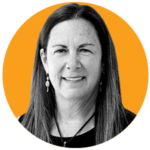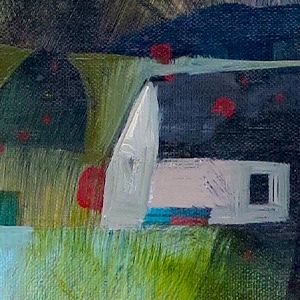
From the Editor
Welcome
Suzanne Shanahan, Editor
Artwork: “Victory for All” by Agucho Velásquez © 2025
There is no such thing as work-life balance.
Everything worth fighting for unbalances your life. —Alain de Botton
This issue of Virtues & Vocations: Higher Education for Human Flourishing is about work: meaningful or purposeful work, balancing work and leisure, and the ethics of work. We have lovely, thoughtful, and compelling essays from engineers, physicians, and educators and deeply personal, often poignant reflections from a range of individuals working in different industries and settings. We have, as in every issue, thoughtfully paired each essay with a piece of art that evokes a sense of work without being overly didactic.
Despite the wisdom and beauty each offers, I find our collective fascination with work perplexing, and the academic interest in work even more so. Maybe I am channeling my parents, who until their deaths suggested being an academic was not actual work. Maybe it is the fact that I have told students for so many years that I have the best job in the world—I drank my own Kool-Aid. Or maybe it is the fact that I so love what I do that it doesn’t feel like the kind of labor I imagine “real jobs” to be. Is a rarified life of reading, writing and teaching actually work? Can privileged work still be called work? Isn’t this really what Aristotle meant by leisure?
Certainly, we are all shaped by the cultures of work within which we operate. Three conversations across many, many years of work with colleagues seem relevant here. First, as a graduate student one advisor told me to never turn my office light out so people always think you are working. Another laughed at the suggestion, noting that success was based on output not on input.
Fair enough, I thought. The goal of an academic is production. A good publication is a good publication whether it took 3 weeks or 3 years. But don’t we all glean some satisfaction from the extraordinary effort in all parts of our life? The more we put in, the more invested we feel. Winning a hard-fought tennis match, baking that crazy hard-to-make pie, learning that musical piece, the unnecessarily difficult hot yoga class, winning over that super cranky neighbor—all seem somehow bigger victories. I studied Chinese in college not because I cared all that much about China, but because I was in college so why not study the language that seemed more challenging. Intensity matters.
Second, as a junior faculty member I recall a colleague telling me of a conversation that he had with his partner. The partner suggested that his life as a professional sociologist was not that of an all-consuming, mad scientific or artistic genius. The partner further suggested that he ought, perhaps, approach it like a job: go to work, come home, act like a responsible adult.
This one has really followed me around. Sure, a bit more discipline never hurt anyone—though I do love being totally immersed in my work. I love when it feels all consuming. But no, that does not exempt me from my responsibility to others. I think we all have that brilliant but insufferable colleague who assumes brilliance is an excuse for bad behavior—or worse, slacker behavior. Not every day can or even maybe should be about the obsessive high that work can provide, even small bits of everyday can be pretty great.
Third, recently, a faculty colleague quite sheepishly told me that if she won the lottery, she’d quit her job and move to France the next day. It was as if that somehow signaled a lack of commitment. I love this one. I think if she said this five years ago, I might have struggled to see her perspective. If I love what I do and it really isn’t work, why retire? I find retiring hard to imagine, but the prospect of a not-yet-imagined, new life of work as a florist, dog breeder or novelist is increasingly a delightful daydream—not unlike winning the lottery.
Ultimately, I guess I’m closer to de Botton on this one. I thrive on the all-encompassing, often unsettling, enthrall of my work. It is not who I am, but it is something that gives me great joy. My work is an extraordinary privilege for which I am grateful every day.
As you peruse this particular issue, I want to draw your attention to one new dimension of our work: our new Editorial Board. Three years ago, we piloted this biannual Virtues & Vocations magazine in the hopes that it would resonate with an interdisciplinary community of scholars and practitioners variously interested in the cultivation of character, meaning and purpose across the professions. We aspired to something clever—insightful but beautiful. We wanted something that felt good: to read and to touch. We wanted to offer varied writers a space to share with a diverse public audience not just what they think, but how they think. We have been so thrilled by the reception and the interest that only continues to grow. But a biannual publication is a bit beyond the scope of even the world’s best tiny, part-time team of two (my extraordinary colleagues Erin Miller and Sam Deane) with the assistance of a fabulous designer (Karen Sheets). And so we have enlisted the counsel of 6 world-class, creative scholars from across the country who share our aspiration for a fresh voice in the national character conversation to serve as our inaugural Editorial Board: Rosalyn Berne (University of Virginia), Paul Blaschko (Notre Dame), Karen Bohlin (Harvard), Jennifer Frey (University of Tulsa), Abraham Nussbaum (University of Colorado School of Medicine), and Francis Su (Harvey Mudd). This issue features three wonderful pieces from board members. We are excited to have them on board as advisors and regular contributors.
We hope you have as much fun reading this magazine as we had producing it. For us, it was good work.

Suzanne Shanahan is the Leo and Arlene Hawk Executive Director, Institute for Social Concerns, University of Notre Dame.
Fall 2025
Part I: Employing Virtue
Chris Higgins
Anna Bonta Moreland
Karen E. Bohlin
Zena Hitz
Interlude: Meaningful Employment
Michelle Weise
Part II: Employing Vocation
MORE

















